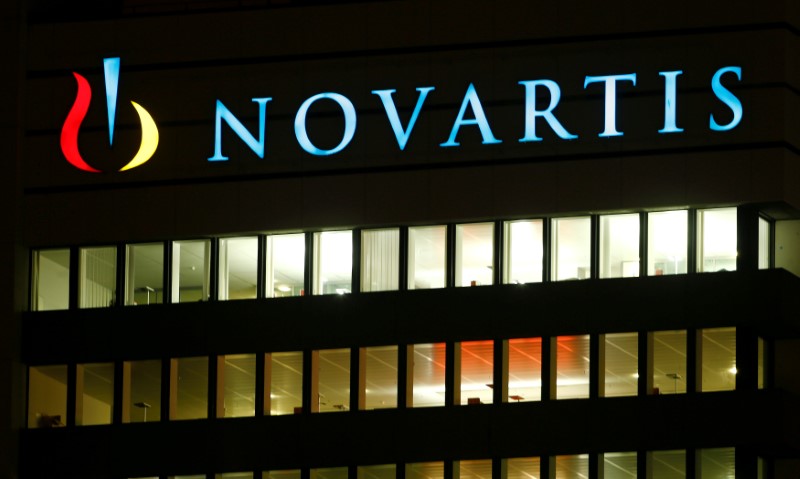By John Miller
ZURICH (Reuters) - As Novartis considers asset sales that could raise $50 billion (39 billion pounds), investors are worried any cash raised may give the Swiss drugmaker firepower for another unsuccessful megadeal.
Novartis's $52 billion takeover of U.S.-based eye care giant Alcon, completed in 2011, saddled it with a business whose sales and profit have faltered two years running.
Now, Chief Executive Joe Jimenez is reviewing Alcon's surgical devices and contact lens businesses, suggesting they could be valued at $25-$35 billion if he unloads them.
The American CEO is also considering disposal of a roughly $14 billion stake in cross-town rival Roche, as well as his over-the-counter (OTC) drugs venture with GlaxoSmithKline, worth some $10 billion.
Given Alcon missteps, however, investors are wary about arming Novartis with a pile of cash, for fear managers eager to refocus on cancer drugs as they address a sales hit from patent expiries might blunder into a big takeover.
"We would applaud selling those stakes, generally," said Stephen Anness of Invesco Perpetual, Novartis's 23rd largest shareholder, according to Thomson Reuters data.
"But what do you do with that money?" Anness said. "I would be very cautious about selling stakes...in things to raise a war-chest to go and do a massive deal, only for that deal to go and be another poor deal."
To be sure, Jimenez has said Novartis's M&A focus remains on smaller transactions, including lower-risk drug licensing deals, ranging up to $5 billion.
Still, Jimenez has not dismissed the notion of a larger transaction. He suggested last year the Roche stake - amassed during former chairman and CEO Daniel Vasella's unrequited merger aspirations two decades ago - could be sold once another, potentially more significant transaction is lined up to absorb the proceeds.
"We’re always monitoring what’s going on but have not changed our position regarding our M&A strategy or potential disposals," Novartis spokesman Michael Willi told Reuters.
PORTFOLIO HOLES
Novartis, which is holding a two-day investor event in Boston on Tuesday and Wednesday, has portfolio holes a major deal could help fill.
Where rivals including Roche, Merck (NYSE:MRK) and Bristol-Myers Squibb have immuno-oncology drugs (I-O) on the market for a range of cancers, Novartis has only investigational molecules in this hot new therapy area.
Vas Narasimhan, Novartis's drug development chief, could be tempted to look outside the company, some analysts said, especially as competitors including AstraZeneca near approval for their own I-O molecules.
"We believe that Novartis may be pushed to liquidate assets in order to finance acquisitions in pharma," said Michael Leuchten, a UBS analyst.
Speculation that Novartis might buy AstraZeneca sparked a brief jump in the British company's stock last year. There has also been talk of its interest in Bristol-Myers.
PUT OPTION
For its OTC joint venture with GSK that emerged out of their2014 asset swap, Novartis faces a March 2018 deadline to exercise its put option for its 36.5 percent stake.
People familiar with GSK's thinking confirmed the British group would be a willing buyer of the stake, which added $234 million to Novartis's profit last year.
Alcon, whose eye drugs portfolio was moved into Novartis's main pharmaceuticals unit last year, has been trimmed to include surgical equipment for conditions like cataracts as well as contact lenses and solutions.
When Jimenez began his strategic review this year, he said "all options were on the table". Sales have fallen nine quarters, necessitating a costly programme to arrest the fall.
Even Vasella, who bought Alcon as he sought to build up a European healthcare giant akin to Johnson & Johnson (NYSE:JNJ), now acknowledges the transaction was a mistake.
Alcon's problems have coincided not only with the patent expiration of its blockbuster cancer drug Gleevec but also with the lacklustre launch of Novartis's new heart failure medicine Entresto, which in 2016 missed sales expectations.
Like Alcon, Entresto has forced the company to step up marketing investments.
A fund manager among Novartis's top-60 investors said the Alcon and Entresto stumbles raise red flags about managers' ability to tackle business challenges like a big takeover.

"A big deal might solve some of their issues, but personally I would prefer to see them doing smaller acquisitions," the investor said. "A cash mountain of $50 billion would definitely make me nervous."